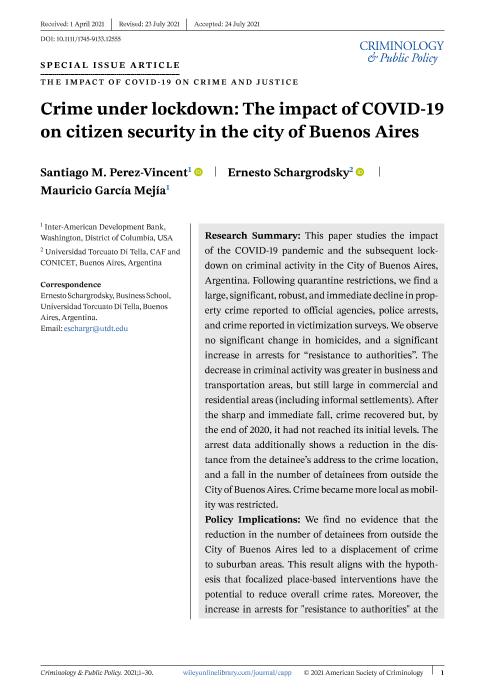Mostrar el registro sencillo del ítem
dc.contributor.author
Pérez Vincent, Santiago M.
dc.contributor.author
Schargrodsky, Ernesto Santiago

dc.contributor.author
García Mejía, Mauricio
dc.date.available
2022-07-05T18:52:33Z
dc.date.issued
2021-08
dc.identifier.citation
Pérez Vincent, Santiago M.; Schargrodsky, Ernesto Santiago; García Mejía, Mauricio; Crime under lockdown: the impact of COVID-19 on citizen security in the city of Buenos Aires; John Wiley & Sons Inc.; Criminology and Public Policy; 20; 3; 8-2021; 463-492
dc.identifier.issn
1538-6473
dc.identifier.uri
http://hdl.handle.net/11336/161342
dc.description.abstract
This paper studies the impact of the COVID-19 pandemic and the subsequent lockdown on criminal activity in the City of Buenos Aires, Argentina. Following quarantine restrictions, we find a large, significant, robust, and immediate decline in property crime reported to official agencies, police arrests, and crime reported in victimization surveys. We observe no significant change in homicides, and a significant increase in arrests for “resistance to authorities”. The decrease in criminal activity was greater in business and transportation areas, but still large in commercial and residential areas (including informal settlements). After the sharp and immediate fall, crime recovered but, by the end of 2020, it had not reached its initial levels. The arrest data additionally shows a reduction in the distance from the detainee's address to the crime location, and a fall in the number of detainees from outside the City of Buenos Aires. Crime became more local as mobility was restricted. Policy Implications We find no evidence that the reduction in the number of detainees from outside the City of Buenos Aires led to a displacement of crimeto suburban areas. This result aligns with the hypothesis that focalized place-based interventions have the potential to reduce overall crime rates. Moreover, the increase in arrests for "resistance to authorities" at the checkpoints set up during the lockdown shows that the enforcement of mobility restrictions can cause frictions between citizens and police, negatively affecting police's legitimacy. We also find that the increased government presence for the provision of health and social services in informal settlements during the pandemic led, as a positive externality, to an additional decrease in crime.
dc.format
application/pdf
dc.language.iso
eng
dc.publisher
John Wiley & Sons Inc.

dc.rights
info:eu-repo/semantics/openAccess
dc.rights.uri
https://creativecommons.org/licenses/by-nc-nd/2.5/ar/
dc.subject
ARGENTINA
dc.subject
CITIZEN SECURITY
dc.subject
CRIME
dc.subject
DISPLACEMENT
dc.subject
LOCKDOWN
dc.subject
COVID-19
dc.subject.classification
Economía, Econometría

dc.subject.classification
Economía y Negocios

dc.subject.classification
CIENCIAS SOCIALES

dc.title
Crime under lockdown: the impact of COVID-19 on citizen security in the city of Buenos Aires
dc.type
info:eu-repo/semantics/article
dc.type
info:ar-repo/semantics/artículo
dc.type
info:eu-repo/semantics/publishedVersion
dc.date.updated
2022-07-05T14:51:17Z
dc.identifier.eissn
1745-9133
dc.journal.volume
20
dc.journal.number
3
dc.journal.pagination
463-492
dc.journal.pais
Estados Unidos

dc.journal.ciudad
Nueva Jersey
dc.description.fil
Fil: Pérez Vincent, Santiago M.. Inter American Development Bank; Estados Unidos
dc.description.fil
Fil: Schargrodsky, Ernesto Santiago. Consejo Nacional de Investigaciones Científicas y Técnicas; Argentina. Universidad Torcuato Di Tella; Argentina
dc.description.fil
Fil: García Mejía, Mauricio. Inter American Development Bank; Estados Unidos
dc.journal.title
Criminology and Public Policy
dc.relation.alternativeid
info:eu-repo/semantics/altIdentifier/url/https://onlinelibrary.wiley.com/doi/full/10.1111/1745-9133.12555
dc.relation.alternativeid
info:eu-repo/semantics/altIdentifier/doi/http://dx.doi.org/10.1111/1745-9133.12555
Archivos asociados
